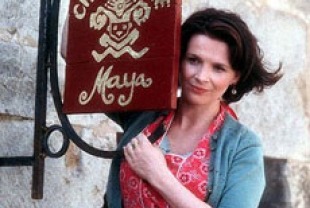God has a gloriously inventive imagination and a love of diversity. One of the greatest challenges facing followers of the world's religions in the twenty-first century is to learn to respect the differences we find in one another and not to view them as threats to ourselves. This charming and edifying comic fable is directed by Lasse Hallström (The Cider House Rules) with a screenplay by Robert Nelson Jacobs based on the novel by Joanne Harris.
Lansquenet is a small, quaint French town in 1959. It's a place that holds fast to its traditions, thanks largely to its zealous mayor, the Comte De Reynaud (Alfred Molina), whose brand of Catholicism is repressive, austere, and distrustful of strangers. Of course, he bears the burden of a lonely life without his wife, who has gone on a mysteriously long trip to Venice.
One day a wayward north wind blows open the doors of the Catholic Church during the sermon by parish's new priest (Hugh O'Conor), who is so inexperienced and insecure he allows the mayor to edit his sermons. Arriving in town at that very moment is Vianne Rocher (Juliette Binoche), the single parent of Anouk (Victoire Thivisol), her young daughter who serves as the narrator for this sprightly tale. Still unused to moving about like vagabonds, she has invented an imaginary kangaroo as her closest companion.
Vianne earns the immediate ire of the Comte de Reynaud by opening a chocolate shop during Lent, a season of rigorous discipline and denial. Besides her exuberant delight in life, this outsider has the knack for reaching out to other pariahs in the tightly knit village. They include Josephine (Lena Olin), a victim of domestic violence; Armande Voizin (Judi Dench), a curmudgeonly elder who has been denied access to her grandson (Aurelien Parent Koenig) by her prissy daughter Caroline (Carrie-Anne Moss); and Guillaume Blerot (John Wood), who yearns to court a widow (Leslie Caron) whose husband died in World War I.
Vianne endears herself to this small segment of the community by guessing their favorite chocolates and treating them like royalty. Meanwhile the mayor spreads malicious rumors about her sexual brazenness and subservience to the devil. Tensions in the town come to a boiling point with the arrival of a band of riverboat gypsies. Roux (Johnny Depp), their Irish leader, is immediately attracted to the free-spirited Vianne. This only fuels the Mayor's campaign to drive her out of town.
Lasse Hallström's films (The Cider House Rules, What's Eating Gilbert Grape, My Life as a Dog) demonstrate a compassion for the considerable flaws of human beings — especially those who are high-strung and unable to respond spontaneously to what is happening in the moment. He also has a special place in his heart for those wild ones who break the rules and often wind up moving on in search of a more spacious place. Although Vianne comes across as a gracious bohemian, she has her own lessons to learn in this small community.
At one point in her ministry, the Christian mystic Mechtild of Magdeburg was asked, "How should one live?" Her short and sweet answer: "Welcoming to all." This important spiritual practice is beautifully delineated in Chocolat.
